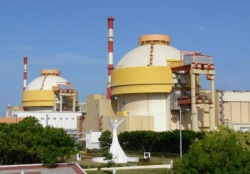A panel of two judges at India's Supreme Court has concluded that the Kudankulam nuclear power plant is vital for the country's economic growth and dismissed widespread public apprehension at the project as having 'no basis'.
 |
| Kudankulam |
Judges KS Radhakrishnan and Dipak Misra reached their decision after considering detailed submissions including the criticisms levelled against the plant by its detractors and submissions from the legal representatives of Nuclear Power Corporation of India Ltd (NPCIL) and the Atomic Energy Regulatory Board (AERB). Their 247-page ruling covered India's nuclear power history, safety, international agreements, social responsibility, environmental issues and civil liability for nuclear damage among many other things.
After considering the evidence presented to them, the judges ruled that NPCIL had met all safety requirements, both on and off site, and that the code of practice laid down by the AERB, based on nationally and internationally recognised safety standards, had been followed. Furthermore, Judge Misra focused on the vital role of nuclear power in meeting India's energy needs. "The present case is one where there is need for nuclear energy for the welfare of the public and for other welfare of the people of India," he said.
The judges found that the decision to build the plant was justified, that all safety and security measures had been taken and necessary statutory permissions and clearances obtained. "Apprehension expressed by some sections of the public that if the units are commissioned or put into operation, it will have far reaching consequences … in our view has no basis," the judges noted.
Naturally the judges stressed that full regulatory processes must be followed in the commissioning of the plant, but they also directed that criminal charges against protestors should be withdrawn "so that peace and normalcy be restored at Kudankulam" while steps are taken to communicate to people "the necessity of the plant which is in the largest interest of the nation particularly the State of Tamil Nadu."
Two Russian-designed and supplied VVER-1000 reactors are under construction at Kudankulam in Tamil Nadu under a Russian-financed contract signed in 1988. The project is controlled by Indian state nuclear company NPCIL, with Russian oversight. Construction began on the units in 2002 and they were completed shortly before the Fukushima accident of March 2011, but the sudden growth of a powerful local protest movement delayed the start of commissioning until the state government intervened in March 2012. Technical issues discovered during commissioning of unit one have necessitated the replacement of several valves in the passive core cooling system, leading to further delays.
Researched and written
by World Nuclear News




_53504.jpg)

_13505.jpg)
_87975.jpg)






